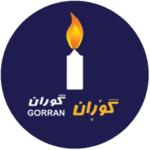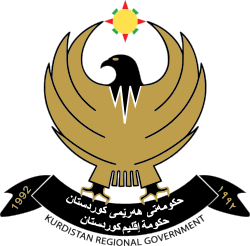Gorran Movement
The Gorran Movement (literally: Movement for Change) (Kurdish: Bizûtinewey Gorran / بزووتنەوەی گۆڕان) or just Gorran (Change) is a Kurdish people political party in Iraq[3] under the leadership of Omar Said Ali, founded in 2009 by Nawshirwan Mustafa. Gorran is the third largest political party by votes in Iraqi Kurdistan, after the Kurdistan Democratic Party and the Patriotic Union of Kurdistan.
Movement for Change بزوتنهوهی گۆڕان Bzutinewey Gorran | |
|---|---|
 | |
| Leader | Omar Said Ali |
| Founder | Nawshirwan Mustafa |
| Founded | 2009 |
| Split from | Patriotic Union of Kurdistan[1] |
| Headquarters | Sulaymaniyah, Iraqi Kurdistan |
| Ideology | Secularism Kurdish nationalism Social liberalism[2] |
| Political position | Centre to centre-left |
| Colors | Blue |
| Council of Representatives of Iraq | 5 / 329 |
| Kurdistan Parliament | 12 / 111 |
| Website | |
| gorran | |
 |
|---|
| This article is part of a series on the politics and government of Kurdistan Region |
|
|
|
|
Political parties
|
Gorran under Nawshirwan Mustafa
According to the BBC Gorran had "already shaken the political landscape in Kurdish areas" in March 2010.[4] Support for the Movement for Change "stems from the simple fact that it is the new, dynamic, fresh option in Kurdistan"[5] and its "calls for an end to monopoly control of power".[6] One of Gorran's main objectives is to "uproot rampant corruption".[7] The party is particularly popular with the youth of Kurdistan and campaigns against patronage.[8] It consists of a mix of (former) PUK/KDP members, Peshmerga, and academics.[9] Gorran supporters have often faced "violent intimidation".[10] Gorran have stated in The Economist that "the KDP and PUK have done a poor job of promoting the Kurds’ interests at the federal parliament in Baghdad".[11] The party in the 2009 and 2010 elections "won in the city and the province of Sulaimaniyah".[12]
2009 Kurdistan Region parliamentary election and 2010 Iraqi parliamentary election
The Change List won a total of 25 seats in the July 2009 elections,[13] making it the second-most successful list in the election after the Kurdistani List. The party viewed the election results as a huge victory. The movement's platform for the 2009 election was to de-politicise the regional government, strengthen the judiciary, limit political interference in the economy and make the budget more transparent. Supporting federalism for Iraq, it said disputes with the central government could be solved through dialogue based on the Iraqi Constitution.[14] Considered to be the main opposition to Kurdistan List, particularly in areas dominated by the Patriotic Union of Kurdistan. The campaign focused on addressing what it sees as corruption undertaken by the Kurdistan Democratic Party and Patriotic Union of Kurdistan. It managed to win eight seats.
2013 Kurdistan Region parliamentary election and 2014 Iraqi parliamentary election
Gorran won 24 seats[15] in the 2013 Kurdistan Region parliamentary election and 9 seats[16] in the 2014 Iraqi parliamentary election.
2011 Kurdish protests in Iraq
In 2011 the party called for the resignation of the Cabinet and the disbanding of the Kurdistan Regional Government during the protests in Kurdistan that followed the 2011 Egyptian protests.[17] This was accompanied by protests against the Kurdistan Regional Government and the Kurdistan Democratic Party.[18][19][20] Some have criticized the party for causing unnecessary unrest, arguing that there is no need for the Kurdish government to step down.[21] Amnesty International and the Human Rights Watch have urged protests to be allowed. February 17, 2011, Human Rights Watch reported security guards firing on protesters in Sulaimaniya, killing at least one person and wounding more than 33 others after the crowd threw rocks at the political headquarters of the KDP.[22] Since there were shootings which led to deaths, Amnesty International and Human Rights Watch called for an independent investigation into the killings.[22][23][24]
Gorran under Omar Said Ali
Following death of the party leader, Nawshirwan Mustafa, in May 2017, an internal ballot was held to elect a new leader, Omar Said Ali, and six other executive assembly members.[25]
2018 Kurdistan Region parliamentary election and 2018 Iraqi parliamentary election
Under the new leadership of Omar Said Ali, Gorran failed to present a lasting challenge to the KDP-PUK duopoly and the movement's popularity has been declining. As a result Gorran suffered a harsh blow winning only 12 seats in the 2018 Kurdistan parliamentary election and only 5 seats in the 2018 Iraqi parliamentary election. The total number of votes for Gorran has shrunk by 60 percent since previous elections and Gorran has lost a significant number of followers and prominent members.[26] Gorran officials are also concerned to an extent about the future of the party, saying it “faces a deadly failure”[27] and has been dogged with infighting.[28] Gorran leadership was criticised for their handling of the referendum, as they had initially opposed the timing of the referendum but eventually supported holding it in September 2017 amid intense political pressure.[29] New Generation, a movement founded by Shaswar Abdulwahid, has taken in Gorran defectors,[30] New Generation has been described as stepping forward as Gorran has fallen back.[31]
The biggest crisis facing Gorran and the source of many of its recent failings and resulting loss of popularity is the ongoing dispute over the parties assets worth hundreds of millions of dollars and include shares in several ongoing projects, including Gasin cement company and metro supermarket as well as 305,000 square meters of land property including the Gorran party headquarters[32] which were secretly seized by Nawshirwan Mustafa's two sons after his death during the funeral while party supporters were in mourning.[33] The brothers’ ownership of the property is seen by many in a negative light and drew allegations of hypocrisy[34] and nepotism, one of the things Gorran was established against.[33] The decision caused a public and political backlash when it was exposed in the independent newspaper Awena,[35] and a growing number of middle- and high-ranking officials as well as grass-roots supporters are adding their voices to the uproar within the party.[33] Mariwan Kanie, a former supporter of the party, has said their claims have damaged the principles of the party and this issue could lead to a disaster which will bring Gorran to its political end.[35]
As a result of Gorran's political direction and subsequent failings after the death of Nawshirwan Mustafa, the party is now split between two main rival factions. The first faction is responsible for all decisions post-19 May 2017 and is seen as wanting to turn Gorran into a family-based party led by Omar Said Ali, Mustafa Said Qadir, Mohammad Tofiq Rahim and Nawshirwan's two sons. The second faction rejects Gorran becoming a family-based party and is led by Othman Haji Mahmud, Qadir Hagi Ali, Aram Ahmad and Abdulay Mala Nuri.[36]
Gorran party structure
Executive Assembly
- Omar Said Ali, general coordinator of Gorran.
- Mohammad Tofiq Rahim, coordinator of internal chambers.
- Jamal Haji Mohammed, coordinator of national assembly.
- Rauf Osman, coordinator of public assembly.
- Jalal Jawhar, coordinator of Parliament factions.
- Vacant, coordinator of regional representatives.
- Shorish Haji, coordinator of public relations.
National Assembly
The national assembly's (Jivat) role is policy. It consists of leaders of Gorran blocs in Iraqi and Kurdish parliaments, coordinators of Gorran departments, district officials and representatives who were successful in Gorran's internal elections.[37]
General Assembly
The general assembly's (Jivat) role is advisory. It consists of former Gorran leaders who have held office and are now retired.
References
- "Centrist Kurdish Groups Emerge in Northern Iraq", The Weekly Middle East Reporter, 20 February 2010
- "PKK Challenges Barzani In Iraqi Kurdistan - Al-Monitor: the Pulse of the Middle East". al-monitor.com. Retrieved 2016-02-07.
- "Goran opposition movement becomes political party". medyanews.com. January 21, 2010. Retrieved October 22, 2011.
- "New Kurdish party to challenge polls". BBC News. Retrieved 2011-02-01.
- "Up on the Hill is where you'll find us". blog.fpc.org.uk. March 2010. Archived from the original on August 3, 2011. Retrieved October 22, 2011.
- "Reformist gains in Kurdish vote shake Iraq's quiet north". The Independent. Retrieved 2009-07-27.
- "Goran leaves Iraq's Kurdish alliance with less clout". Al Arabiya. Retrieved 2011-02-01.
- Iraq and the United States: creating a strategic partnership - Google Books. Books.google.co.uk. 2009-09-01. Retrieved 2011-10-20.
- "Gains Seen for Kurdish Challengers". New York Times. Retrieved 2009-07-27.
- "Kurdish Iraq: An Emerging Success". CBS News. Retrieved 2011-02-01.
- "The Kurdish way". The Economist. Retrieved 2011-02-01.
- "Change the Kurds can believe in". Sydney Morning Herald. Retrieved 2011-02-01.
- Dagher, Sam (26 July 2009). "Iraqi Kurds come out to vote in high numbers". The San Francisco Chronicle.
- "Kurdish election lists". Niqash.org. 30 June 2009. Archived from the original on 27 July 2011.
- "Iraqi Kurdistan opposition party beats PUK in elections". BBC. Retrieved 27 February 2019.
- "The incumbent digs in". The Economist. Retrieved 27 February 2019.
- "KurdishMedia.com: News about Kurds and Kurdistan". kurdmedia.com. Archived from the original on 2014-04-19. Retrieved 2014-05-27.
- "Iraqis protest in Kurdish region, capital". Reuters. 19 February 2011.
- "Tonårig demonstrant dödad i Irak - Nyheter | SVT.se". svt.se. Archived from the original on 2012-10-09. Retrieved 2014-05-27.
- https://www.google.com/hostednews/canadianpress/article/ALeqM5gvqM5KohOmVipuRKfb39gRT968oQ?docId=6029572
- "The page you requested was not found". Archived from the original on 2011-02-13. Retrieved 2014-05-27.
- "Iraq: Investigate Protester Deaths | Human Rights Watch". hrw.org. Retrieved 2014-05-27.
- thomas yocum. "Document - Iraq: Authorities in Iraq urged to allow peaceful protests | Amnesty International". amnesty.org. Retrieved 2014-05-27.
- "Iraq: Restraint urged in the Kurdistan Region of Iraq following protester deaths | Amnesty International". amnesty.org. Retrieved 2014-05-27.
- "Gorran chooses Omar Said Ali as Nawshirwan's successor, Iraqi Kurdistan". Archived from the original on 2017-08-03. Retrieved 2017-08-03.
- Abdullah Azeez, Hawkar (October 29, 2018). "Gorran: A Party of Words, not Deeds". Washington Institute for Near East Policy. Retrieved 26 February 2019.
- Chomani, Kamal (29 September 2018). "The Leadership Crisis of the Kurdistan Region Opposition Parties". The Tahrir Institute for Middle East Policy. Retrieved 26 February 2019.
- Ismaeel, Bashdar (28 September 2018). "Unease brews as Iraqi Kurds brace for crucial election". The New Arab. Retrieved 26 February 2019.
- Salim, Mustafa (30 September 2018). "Kurds in Iraq hold critical election amid competing visions of the autonomous region". The Washington Post. Retrieved 26 February 2019.
- Fantappie, Maria (28 September 2018). "Iraqi Kurdistan's Regional Elections Test a Brittle Status Quo". International Crisis Group. Retrieved 27 February 2019.
- Fazil, Shivan (5 October 2018). "Iraqi Kurdistan's Parliamentary Elections: Inflection Point or Plateau?". Atlantic Council. Retrieved 27 February 2019.
- "Gorran Suffering from Serious Internal Crisis". Basnews. 11 July 2018. Retrieved 27 February 2019.
- Hawramy, Fazel (9 July 2018). "Iraqi Kurdistan's Movement for Change faces rebellion from within". Al-Monitor. Retrieved 27 February 2019.
- Abdullah Azeez, Hawkar (29 October 2018). "Gorran: A Party of Words, not Deeds". The Washington Institute for Near East Policy. Retrieved 27 February 2019.
- "Public Backlash: Title of Gorran Properties Transferred to Nawshirwan Mustafa's Offsprings". Basnews. 29 August 2017. Retrieved 27 February 2019.
- Hawramy, Fazel (2018-07-09). "Iraqi Kurdistan's Movement for Change faces rebellion from within". Al-Monitor. Retrieved 2019-03-04.
- "Rudaw". Archived from the original on 2012-11-27. Retrieved 2012-11-22.
External links
- Official website
